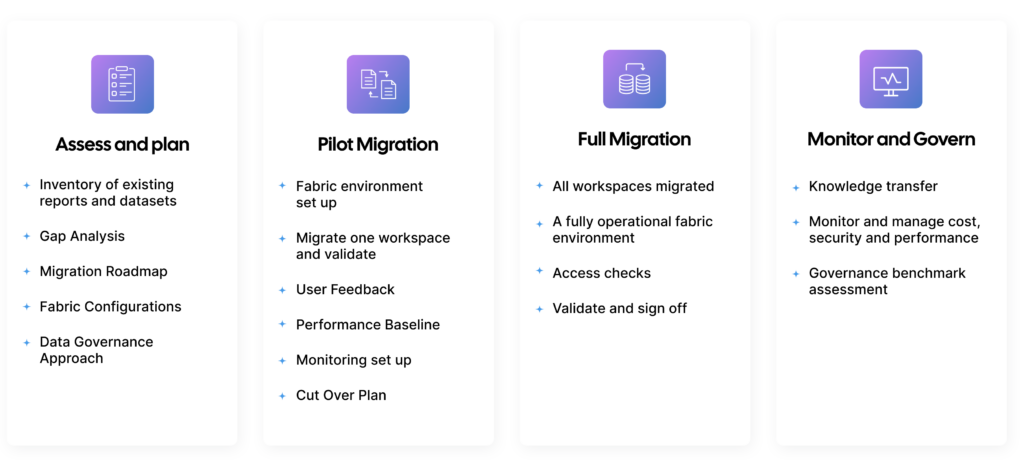As Microsoft shifts its strategy, it has announced that Power BI Premium per capacity will be retired by January 1, 2025, launching an innovative phase with Microsoft Fabric SKU. This transition is a part of Microsoft’s initiative to bring its data services under one integrated platform, making Microsoft Fabric a comprehensive choice for businesses seeking a streamlined data solution.
Key dates and transition process
- July 1, 2024: Sales of Power BI Premium per capacity will be discontinued.
- January 1, 2025: Renewals for Power BI Premium per capacity end, requiring users to transition to Microsoft Fabric SKU.
Existing Power BI Premium capacity users can continue their service until their renewal date. Following January 1, 2025, however, a shift to Microsoft Fabric SKU will be essential for maintaining access to premium capabilities.
Microsoft Fabric: The all-in-one data platform
Microsoft Fabric offers a robust Software-as-a-Service (SaaS) platform, unifying Microsoft Power BI, Azure Synapse Analytics, and Azure Data Factory to simplify analytics, integration, and data transformation. This platform is tailored for organizations requiring a seamless, powerful solution for managing and analyzing extensive data sets. With the expanded capabilities of Fabric, businesses gain access to exclusive Azure features, alongside Power BI Premium’s functionalities, for an all-encompassing approach to data analytics and business intelligence.
With Microsoft Fabric capacity, users gain access to:
- Microsoft Azure Consumption Commitment (MACC): Fabric capacity spending can be applied to MACC commitments, offering financial flexibility.
- Dynamic Scalability: A pay-as-you-go model that allows capacity to be scaled up or down and even paused as needed.
- Exclusive Azure Features: Fabric capacity offers added value through features like trusted workspace access for OneLake shortcuts and Managed Private Endpoints for Spark.
Tangible user benefits of transitioning to Microsoft Fabric
- Unified Analytics: Fabric consolidates analytics tools into a single platform, streamlining workflows, centralizing access, and offering one source of truth for faster, more productive decision-making.
- Enhanced Performance: Integrating Power BI, Synapse Analytics, and Data Factory, Fabric supports high-throughput workloads, enabling large-scale analytics with reduced latency and faster query performance.
- Cost Optimization: Fabric’s dynamic scalability allows businesses to adjust capacity to demand, avoiding over-provisioning and ensuring cost efficiency without compromising performance.
- Advanced AI Features: Built-in AI capabilities support sophisticated analytics, machine learning, and predictive insights, helping organizations extract actionable intelligence and drive AI initiatives.
- Additional Security: With RBAC, Managed Private Endpoints, and data encryption, Fabric prioritizes data protection and compliance, safeguarding sensitive information throughout its lifecycle.
- Improved Collaboration: Real-time collaboration features enable teams to work seamlessly across departments, promoting efficient project sharing and access to data insights.
- Scalable Infrastructure: Fabric’s adaptable infrastructure scales with business growth, handling increased data and analytics needs with high availability and reliability.
Action steps for a smooth transition
To make the most of Microsoft Fabric, consider these recommended steps for a strategic, cost-effective transition:
- Evaluate Transition Plans: Assess the impact of shifting from Power BI Premium per capacity to Microsoft Fabric SKU. While Power BI Pro and Premium per user (PPU) licenses remain unaffected, it’s important to understand the implications for licensing and compatibility, including Power BI Embedded.
- Optimize for Fabric: Migrate current reports and data workflows to fully leverage Microsoft Fabric’s integration with Azure Synapse and Data Factory, creating a cohesive data environment.
- Strengthen Administration: Establish governance and administrative controls within Microsoft Fabric to manage user permissions, access policies, and data security. This ensures that your organization remains compliant.
- Enable Real-Time Intelligence: Utilize Microsoft Fabric’s real-time data processing capabilities to gain actionable insights instantly. By integrating real-time analytics, your teams can make data-driven decisions and respond proactively.
- Reassess Cost Implications: Microsoft Fabric introduces a new pricing model, so reviewing the cost structure to ensure alignment with your business requirements is essential.
- Seek Expert Guidance: As specialists in Microsoft Fabric, our experts can offer tailored support throughout the migration process. From optimizing data workflows to seamless platform integration, we’re here to help you make the transition as efficient and impactful as possible.
Planning and implementing the migration

Existing Power BI Premium per capacity users should collaborate closely with their Microsoft account representatives to navigate the transition. A bulk reassignment of workspaces simplifies the process, and Microsoft provides a 90-day grace period post-subscription end date to complete the migration without service interruptions.
For Enterprise Agreement (EA) customers, renewals of Power BI Premium per capacity can continue until the end of the EA term. However, post-January 1, 2025, these customers will need to adopt Microsoft Fabric SKU at their next renewal to maintain premium features.
Preparing for the future with Microsoft Fabric
This transition to Microsoft Fabric SKU not only reflects Microsoft’s strategic focus but offers businesses a path to more integrated and capable data solutions. As a certified Microsoft Fabric partner, our experts at AVASOFT can help you navigate this transition effectively.
From planning and execution to ongoing support, we’ll guide you through every step, ensuring a seamless integration with your existing systems while minimizing disruptions. We provide a comprehensive assessment of your current data infrastructure, identifying areas for improvement and alignment with Microsoft Fabric’s capabilities. Additionally, our tailored adoption strategy ensures that your organization can migrate smoothly, optimize workflows, and adopt best practices to fully leverage Microsoft Fabric’s features.
Connect with us to explore how we can support your move to Fabric, streamline your data processes, and empower your organization to leverage data insights for competitive advantage.